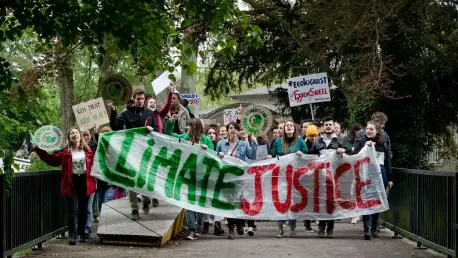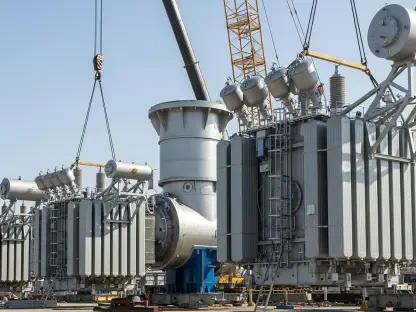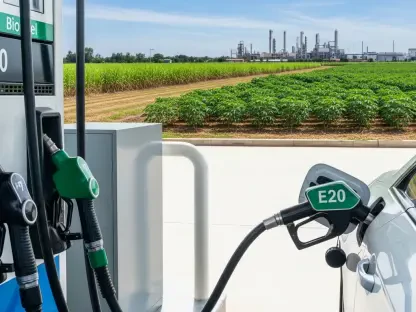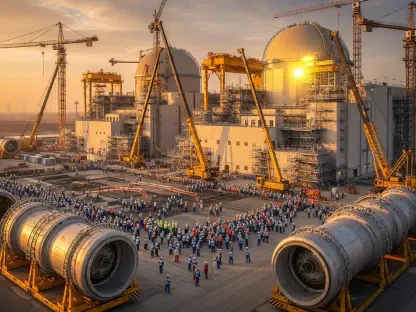Imagine a world where the fight against climate change isn’t just a headline from a far-off summit, but a tangible effort unfolding in every neighborhood, street, and town across the globe, transforming abstract goals into concrete results. International conferences, such as the recent COP30 in Belém, Brazil, craft sweeping agreements and lofty goals, yet carbon emissions continue their relentless climb, revealing a profound disconnect between global promises and real-world impact. This persistent failure highlights an urgent truth: the most effective solutions lie not in distant boardrooms or diplomatic halls, but in local communities where daily decisions about energy, transport, and resources shape the future. By shifting focus to grassroots initiatives and empowering local leadership, society can bridge the gap between ambition and action, ensuring that sustainability isn’t just a buzzword but a lived reality for all.
Global Shortcomings and the Weight of Inequality
The history of global climate efforts paints a sobering picture, with 30 years of international summits failing to curb the steady rise in carbon emissions despite countless commitments. These gatherings, while vital for setting frameworks, often lack the mechanisms to enforce change at the ground level, leaving targets unmet and promises hollow. This shortfall becomes even more glaring when considering the disproportionate impact of climate change on vulnerable populations. Research from Oxfam reveals a stark disparity in the UK, where the wealthiest 0.1% emit more carbon in just over a week than the bottom 50% do in an entire year. Such inequality underscores a systemic flaw in global strategies that fail to address who bears the cost of inaction, as ordinary households struggle with soaring energy and food prices driven by climate disruptions.
Beyond the numbers, the human toll of these global failures demands attention as communities worldwide grapple with the consequences of a warming planet. Failed harvests, extreme weather, and reliance on fossil fuels hit hardest at the local level, where people have little control over the policies that shape their lives. The burden falls unfairly on those least responsible for emissions, exposing a critical need for solutions that prioritize fairness and accessibility. International rhetoric often overlooks these lived realities, focusing on broad strokes rather than the nuanced challenges faced by specific regions. Only by redirecting efforts to empower local actors can the climate crisis be tackled in a way that addresses both environmental and social inequities, ensuring no one is left to shoulder an unfair share of the struggle.
Reimagining Economies for a Sustainable Future
The climate transition extends far beyond a simple switch from fossil fuels to renewable energy; it necessitates a complete overhaul of economic systems to prioritize local needs over unchecked consumption. A decentralized approach, where communities build shared infrastructure like public transport and local food systems, offers a path to reduce energy demand while enhancing quality of life. This vision stands in sharp contrast to the current model, dominated by corporate interests and individual consumption, which often sidelines the well-being of entire populations. By focusing on localized economies, societies can create resilient frameworks that support sustainability without sacrificing equity or access to essential resources.
Such a transformation also requires rethinking how resources and benefits are distributed to ensure they remain within communities rather than being funneled to distant entities. Community housing initiatives and shared public services, for instance, can cut carbon footprints while fostering a sense of connection and mutual support among residents. This shift challenges the status quo of profit-driven growth, advocating instead for systems that measure success by the health and happiness of local populations. Empowering towns and cities to lead this change ensures that solutions are tailored to unique regional needs, avoiding the one-size-fits-all pitfalls of global mandates. Ultimately, redefining economic priorities at the local level lays the groundwork for a future where environmental and social goals align seamlessly.
Building Resilience Through Public Solutions
A low-carbon future cannot hinge solely on individual actions; it demands robust, publicly funded solutions that are deeply rooted in local contexts. Public services such as efficient transit systems, libraries, and community centers play a pivotal role in slashing energy use while strengthening social bonds and resilience. When local governments are given the autonomy and resources to design these initiatives, they can address specific challenges, whether it’s retrofitting buildings for energy efficiency or creating green spaces that combat urban heat. Platforms like the COP Local Leaders Forum highlight the importance of collaboration between national and local entities to make such tailored approaches a reality.
Moreover, public provision acts as a counterbalance to the limitations of market-driven responses, which often prioritize profit over widespread benefit. By investing in collective infrastructure, communities can reduce reliance on high-emission practices, such as excessive car use, and promote sustainable alternatives that serve everyone. This approach also helps mitigate the economic pressures faced by lower-income households, who are frequently priced out of green technologies or services. Ensuring that local authorities have the capacity to implement these systems is crucial, as it fosters trust and accountability among residents. When public solutions are prioritized, the foundation for lasting climate action becomes not just feasible, but a shared responsibility that uplifts entire communities.
Empowering Communities Through Democratic Engagement
For climate initiatives to gain traction, community voices must shape the decision-making process, ensuring that solutions reflect real needs and values. Strong local leadership is essential to bridge the gap between policy and people, preventing alienation that often fuels resistance, as seen with wind farm projects in regions like the Scottish Highlands. When residents feel excluded from the benefits of green developments—such as affordable energy—they are more likely to oppose them, stalling progress. Democratic engagement counters this by fostering dialogue and inclusion, ensuring that local priorities guide the transition to a sustainable future.
Equally important is the principle of fairness in distributing both the burdens and rewards of climate action, so no community is disproportionately impacted. Projects that generate renewable energy, for instance, should directly lower costs for nearby residents rather than solely benefiting distant corporations or shareholders. This just approach builds trust and encourages broader support for green initiatives, turning potential opposition into active partnership. Local leaders play a critical role in advocating for such equity, ensuring that policies are not only environmentally sound but also socially responsible. By centering community input, the path to sustainability becomes a collective journey, rooted in shared goals and mutual benefit.
Balancing Renewable Gains with Consumption Realities
Significant strides in renewable energy offer a glimmer of hope, with renewables surpassing coal in global energy generation for the first half of a key recent period, marking a historic shift. However, this progress is tempered by the reality that much of the growth simply meets escalating energy demand rather than displacing fossil fuels entirely. Without addressing consumption patterns, even the most impressive renewable advancements risk falling short of true sustainability goals. Local communities hold immense potential to drive change here, as grassroots efforts to reduce waste and rethink daily habits can significantly lower overall energy needs.
Complementing technological progress with behavioral shifts at the local level creates a more holistic approach to tackling the climate crisis. Initiatives like community sharing programs, energy conservation campaigns, and local food sourcing can curb excess consumption while reinforcing the impact of clean energy adoption. These efforts require support from local governments and organizations to scale effectively, ensuring that education and resources are accessible to all. The challenge lies in aligning renewable expansion with deliberate reductions in demand, a balance that local action is uniquely positioned to achieve. By focusing on both sides of the equation, communities can transform incremental gains into lasting, systemic change.
Charting the Path Forward with Local Momentum
Reflecting on the journey so far, it’s evident that past global efforts fell short in translating ambitious pledges into measurable reductions in carbon emissions, often leaving local communities to navigate the fallout. The stark inequalities in who contributed most to the problem and who suffered the consequences underscored a need for a different approach. Through dedicated public investment and democratic engagement, many towns and cities began to carve out innovative paths, proving that sustainable change was indeed possible when rooted in local realities. Looking ahead, the momentum must be sustained by equipping local leaders with greater resources and authority to tailor solutions, ensuring that public services and green infrastructure continue to evolve with community needs. Only by committing to this localized strategy can the global fight against climate change achieve the lasting impact it so urgently demands.









